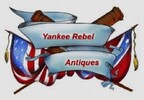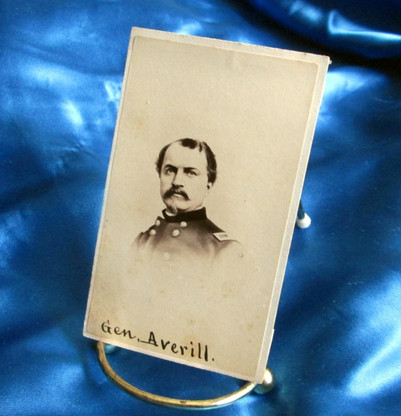 Loading... Please wait...
Loading... Please wait...-
Call us on (973) 810-2976
- My Account
- Gift Certificates
- Items / $0.00
All prices are in All prices are in USD
Categories
- Home
- Photographs
- Rare Civil War CDV image of General William W. Averell
- Home
- Identified Artifacts
- Rare Civil War CDV image of General William W. Averell
- Home
- Non-excavated Artifacts
- Rare Civil War CDV image of General William W. Averell
- Home
- Personal Items
- Rare Civil War CDV image of General William W. Averell
- Home
- REDUCED PRICE ITEMS
- Rare Civil War CDV image of General William W. Averell
Rare Civil War CDV image of General William W. Averell
Out of Stock
Product Description
This is a great Civil War era image of General William W. Averell. It is the typical size of approximately 2 ½” x 4”. Averell first saw action at the First Battle of Bull Run as a lieutenant while acting as assistant adjutant general to Brigadier General Andrew Porter. In August 1861, he was appointed colonel of the 3rd Pennsylvania Cavalry, which he led through the Peninsula Campaign and the Seven Days Battles. Immediately after that campaign, on July 6, 1862, he was given command of the 1st Cavalry Brigade in the Army of the Potomac (see period photo of Averell and staff)
He missed the Battle of Antietam and most of the Maryland Campaign as he recovered from a bout of malaria that was known at the time as "Chickahominy Fever". Averell returned in time to lead his brigade in pursuit of General Jeb Stuart as he was raiding portions of the Union Army and Chambersburg, Pennsylvania. President Abraham Lincoln appointed Averell to a Brigadier General of Volunteers on September 26, 1862. Lincoln had to nominate Averell three times before the U.S. Senate confirmed the appointment on March 11, 1863.
During the Battle of Fredericksburg, Averell was with the Cavalry Brigade of the Army of the Potomac. He ascended to the command of the 2nd Division on February 12, 1863.On March 17 his Cavalry Division fought the first engagement in which Union cavalrymen claimed victory against their Confederate counterparts at the Battle of Kelly's Ford. On May 2, 1863, during the Battle of Chancellorsville, General Joseph Hooker relieved Averell of his command claiming that he was too slow in performing his duties during and approaching the battle.
Averell left the Army of the Potomac after his relief at Chancellorsville and fought a series of minor engagements in the Department of West Virginia at the brigade and division level. In November 1863, he conducted what is called “Averell's West Virginia Raid” against the Virginia and Tennessee Railroad (see painting).
At a time when General Jubal Early had invaded Maryland and defeated a series of Union commanders, Averell proved to be the only Union commander to achieve victory against the Confederates in the Shenandoah Valley. He routed General Stephen D. Ramseur at the Battle of Rutherford's (Carter's) Farm on July 20, inflicting 400 casualties and capturing a four-gun battery, in spite of being significantly outnumbered. When General John McCausland burned Chambersburg, Pennsylvania, to the ground on July 30, Averell tracked him down at Moorefield, West Virginia. Using intelligence gathered from his scouts, Averell routed McCausland in a sunrise attack upon the Confederate camp capturing hundreds of prisoners and another four-gun battery.
During the Valley Campaigns of 1864 against Early, Averell fought under General Philip Sheridan. He was relieved of command a second time in his career on September 23, 1864, following a dispute with Sheridan about his actions at the Battle of Fisher's Hill. This incident truly devastated him and he could not hide his misery. A staff officer wrote "I saw General Averell sitting in front of his tent ... He was dreadfully depressed and broken. I believe he started for the rear within a few moments after we left him, and never was employed again during the war." After Lee’s surrender, Averell resigned from the Union Army Volunteers and from the U.S. Regular Army on May 18, 1865.
On July 17, 1866 General Averell’s Civil War service was redeemed, President Andrew Johnson nominated Averell for appointment to the grades of Brevet Brigadier General and Brevet Major General in the regular army, to rank from March 13, 1865, and the U.S. Senate confirmed the appointments on July 23. The latter appointment was mainly in recognition of Averell's actions at the Battle of Kelly's Ford.
Following the Civil War, President Johnson appointed Averell as U.S. Consul General to British North America (1866–1869). In later life, his skill as an inventor of practical devices provided him with a handsome income. Among his inventions were methods for manufacturing steel castings and insulated electrical cable. He is most famous as the inventor of American asphalt.
This is truly a great CDV - wartime images of General Averell are very hard to find, especially in this condition. At one time this CDV was apparently pasted in an album and the paper from the album remains on the reverse; if there is a backmark, it would be under the paper. (FREE SHIPPING)



